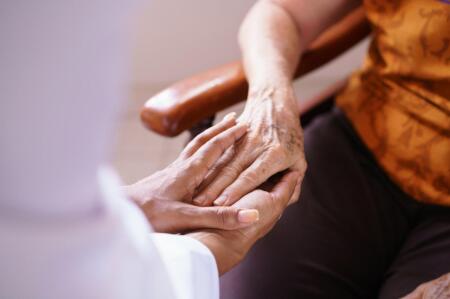Faith and Healthcare: Is There Still Time for Compassion in Today's Fast-Paced Medical Environments?

A career in the medical field is rewarding, exciting, fulfilling — and undeniably fast-paced and sometimes stressful. Because of this, Christians considering a career as a nurse or doctor may wonder: Is there still time for compassion in today’s fast-paced medical environments?
One of the greatest ways to be the “hands and feet” of Jesus Christ is to enter a career in the healthcare field. Doctors, nurses, and other healthcare professionals are given the unique opportunity to care for others in a holistic way, taking into account the spiritual, physical, and mental needs of their patients.
However, a career in healthcare also presents challenges unanticipated by many prior to entering the field, from heartache and sorrow to exhaustion and burnout.
Stress in the healthcare field is well-documented; Health care providers have higher stress levels and complaints than employees of any industry, including the professional, business service, and retail sectors, according to a recent CareerBuilder survey. In total, 69% of healthcare workers reported feeling stressed, and 17% reported feeling highly stressed.
Commenting on the study’s findings, Jason Lovelace, president of CareerBuilder Healthcare, said that while stress is a hallmark of many health care jobs, "high levels sustained over a long-period of time can be a major detriment to employee health and ultimately stand in their way of providing quality care to patients."
Here are a few things to keep in mind while considering a career in the healthcare field.
Jesus as The Great Physician
Throughout the New Testament, Jesus is described as the Great Physician: “When Jesus heard it, he said to them, ‘Those who are well have no need of a physician, but those who are sick. I came not to call the righteous, but sinners.’” - Mark 2:15-17
As demonstrated by His many miracles, Jesus was concerned not only with humanity's spiritual condition but also with its physical state. Matthew 8:2-3 recounts one such healing: “And behold, a leper came to him and knelt before him, saying, “Lord, if you will, you can make me clean.” And Jesus stretched out his hand and touched him, saying, “I will; be clean.” And immediately his leprosy was cleansed.”
During His short time on earth, Jesus showed compassion to the multitudes (Mark 8:2), healed the sick, opened the eyes of the blind, made the lame walk, and the deaf to hear.
When Jesus healed a woman on the Sabbath, His reply to the criticism was: "Should this woman... not be set free on the Sabbath day from what bound her?" (Luke 13:16). The Bible tells us that Jesus empathizes with the pain associated with losing a loved one. When He heard of the death of His friend, Lazarus, the Bible simply says, “Jesus wept.” In His Sermon on the Mount, He told His disciples: “Blessed are they that mourn: for they shall be comforted.”
Because Jesus became flesh and suffered and died on the cross, He understands human pain and frailty: Isaiah 53:3 tells us, “He was despised and rejected by mankind, a man of suffering, and familiar with pain. Like one from whom people hide their faces he was despised, and we held him in low esteem.”
Likewise, before He ascended to Heaven, Jesus urged His disciples to follow in His footsteps, exhorting them to heal the sick as they proclaimed the kingdom of God to the lost. "He sent them [the twelve disciples] out to preach the kingdom of God and to heal the sick" (Luke 9:2).
How does Jesus’ life and ministry as The Great Physician pertain to our modern-day healthcare practices?
Compassionate Care Based on Jesus’ Example
Jesus’ ministry was one defined by compassion and concern for society’s most vulnerable members. He viewed everyone — from the leper to the tax collector — as precious souls created in the image of God the Father, complete with value and dignity.
Jesus’ heart for the weakest members of society is is clearly outlined in Matthew 25:40-45. The passage reads, in part: “The King will reply, ‘Truly I tell you, whatever you did for one of the least of these brothers and sisters of mine, you did for me.’” Similarly, Proverbs 14:31 says, “Whoever oppresses the poor shows contempt for their Maker, but whoever is kind to the needy honors God.”
As healthcare professionals, we are called to treat every patient — regardless of age, race, gender, sexuality or social class — with the same respect and care Jesus showed His patients. In today’s fast-paced medical environment, remembering that our role is to present Christ to others, in action and words, is of the utmost importance.
Viewing patients as created in the image of God allows us to go beyond the basic requirements of the job description in extending Christ-like, compassionate service to those in our care.
Integrating Faith into the Profession
As Christians in the healthcare field, it’s important to be intentional about bringing clinical competency and spiritual commitment together. By continually integrating faith into medical care, compassion becomes an instinctual, natural response under pressure. Because we are comforted by the Great Comforter, we are able to comfort others in crisis. 2 Corinthians 1:4 refers to the Holy Spirit as One “who comforts us in all our troubles, so that we can comfort those in any trouble with the comfort we ourselves receive from God.”
Dr. Laurel Shaler, author of Reclaiming Sanity: Hope and Healing for Trauma, Stress, and Overwhelming Life Events, puts it this way: “While you don’t necessarily have to be a Christian to show compassion, my compassion, as a believer, comes from a different place; it truly comes from having the Holy Spirit in me. As Christians, we are able to rely on Jesus as our anchor, our hope and our peace, and that differentiates us from others. In my field, I look to Scripture and weave those into my various interventions. Everyone who has experienced something traumatic is looking to cling to someone, and that person is Jesus.”
She added, “While we want to make sure we are guided by ethics and evidence-based treatment, we also must remember that we can integrate our faith in an ethical manner. Our job isn’t to proselytize, but as Christians, we are walking witnesses in whatever we do.”
Taking Time to Rest
Only half of U.S. adults employed full-time work 40 or fewer hours a week, according to a 2014 Gallup poll. The average workweek is now 47 hours, the poll found, with nearly one in five full-time workers clocking 60 hours or more. In healthcare, long shifts are standard practice — and breaks are sometimes difficult to come by.
The healthcare field tends to attract compassionate, empathetic individuals. Unfortunately, these qualities, while positive, can also leave one susceptible to "nurse burnout.” This term describes the physical, mental and emotional exhaustion healthcare providers often experience due to work stress. When we experience such burnout, we are unable to care for our patients to the best of our ability.
During Jesus' time on earth, He sometimes escaped the busyness of the crowds to renew His strength. Mark 6:31 says, “Then, because so many people were coming and going that they did not even have a chance to eat, he said to [His disciples], 'Come with me by yourselves to a quiet place and get some rest.
Jesus — the Son of God — understood the importance of rest in the midst of a chaotic world. Similarly, we are called to follow His example by setting boundaries and resting, both in our personal and professional lives.
To avoid “nurse burnout,” Carol Rickard, LCSW, TTS and author of Stretched Not Broken: A Caregiver's Toolbox for Reducing and Managing Stress, advises taking time to oneself, whether it’s an extended vacation, quality time alone, or two minutes in the break room.
"Think of a bottle of soda," she explained. "If you shake a bottle, the pressure builds up inside. I believe the same thing happens to us."
Rickard recommends the same kind of thing one would do with an over-pressurized bottle of soda: "Step 1: Stop the pressure from building by doing something calming for 60 seconds. Step 2: Release what's there by doing something active for 60 seconds," she said.
Ultimately, the weary soul finds rest and relief from its stress in listening to God’s voice and speaking to Him in prayer. “Come to me, all who labor and are heavy laden, and I will give you rest. Take my yoke upon you, and learn from me, for I am gentle and lowly in heart, and you will find rest for your souls. For my yoke is easy, and my burden is light.” (Matthew 11:28–30).
Working as if Unto the Lord
The Apostle Paul reminds us that “whatever you do, work at it with all your heart, as working for the Lord, not for human masters” (Colossians 3:23). As Christian healthcare professionals, we should be marked by the fruits of the Spirit - love, joy, peace, patience, kindness, goodness, faithfulness, gentleness and self-control (Galatians 5:22).
Showing true compassion to patients in today’s fast-paced medical environments is no easy task. In fact, it’s impossible in our own human strength. To achieve this goal, we, as healthcare providers, must be prayerfully dependent upon God (1 Thessalonians 4:17) while striving for excellence in the workplace (Proverbs 14:23) and exemplifying Christ-like love for in all interactions (1 Corinthians 16:14).
>>>Request for Liberty University Online degree info now.





